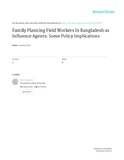| dc.contributor.author | Andaleeb, Syed Saad | |
| dc.date.accessioned | 2016-06-07T14:34:45Z | |
| dc.date.available | 2016-06-07T14:34:45Z | |
| dc.date.issued | 2011-10 | |
| dc.identifier.citation | Andaleeb, S. S. (2004). Family planning field workers in Bangladesh as influence agents: some policy implications. Journal of Health & Population in Developing Countries, 1–18. Retrieved from https://www.researchgate.net/publication/265044767 | en_US |
| dc.identifier.issn | 1095 -894 0 | |
| dc.identifier.uri | http://hdl.handle.net/10361/5440 | |
| dc.description | This is an Open Access Article. It is published by The Journal of Health and Population in Developing Countries (ISSN 1095-8940)
is a publication of the Department of Health Policy and Administration, School of Public Health University of North Carolina at Chapel Hill. | en_US |
| dc.description.abstract | The family planning program in Bangladesh is one of the country’s success stories. However, in the
quest to gain cost efficiencies, there are suggestions to scale back the role of the family planning field
workers so that clients receive health and family planning services from fixed facilities established
throughout the country. It is hoped, as a result, that clients will adopt more permanent methods of
contraception. What are the implications of scaling back the role of the field worker? Over nearly three
decades, they have helped shape the demographic transition underway in Bangladesh. As the most direct
point of contact with their clients and devoting much of their time to building ongoing relationships, the
social capital the filed workers have apparently built and the consequent influence they may have over
fertility behavior is likely to be substantial. Under the circumstances, dissipation of this social capital
would represent to the program the loss of an intangible asset of great magnitude. This study examines,
from the fieldworkers' perspectives, the extent of influence they have over their clients and the factors
that explain their influence. Policy implications are discussed in view of the findings. | en_US |
| dc.format.extent | 21 pages | |
| dc.language.iso | en | en_US |
| dc.publisher | © Department of Health Policy and Administration, School of Public Health University of North Carolina | en_US |
| dc.relation.uri | https://www.researchgate.net/publication/265044767 | |
| dc.subject | Family planning | en_US |
| dc.subject | Field workers | en_US |
| dc.title | Family planning field workers in Bangladesh as influence agents: some policy implications | en_US |
| dc.type | Article | en_US |
| dc.description.version | Published | |

